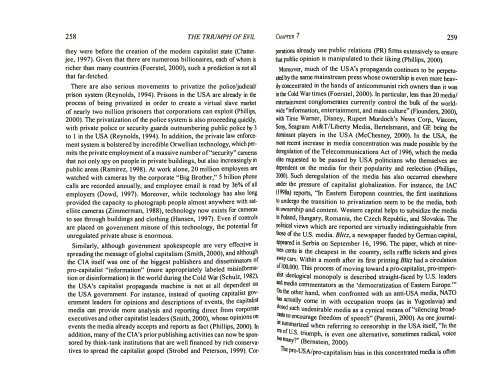austin-murphy-the-triumph-of-evil
austin-murphy-the-triumph-of-evil
austin-murphy-the-triumph-of-evil
Create successful ePaper yourself
Turn your PDF publications into a flip-book with our unique Google optimized e-Paper software.
258 THE TRIUMPH OF EVIL<br />
<strong>the</strong>y were before <strong>the</strong> creation <strong>of</strong> <strong>the</strong> modem capitalist state (Chatter<br />
jee, 1997). Given that <strong>the</strong>re are numerous billionaires, each <strong>of</strong> whom is<br />
richer than many countries (Foerstel, 2000), such a prediction is not all<br />
that far-fetched.<br />
There are also serious movements to privatize <strong>the</strong> police/judiciaU<br />
prison system (Reynolds, 1994). Prisons in <strong>the</strong> USA are already in <strong>the</strong><br />
process <strong>of</strong> being privatized in order to create a virtual slave market<br />
<strong>of</strong> nearly two million prisoners that corporations can exploit (Phillips,<br />
2000). The privatization <strong>of</strong> <strong>the</strong> police system is also proceeding quickly,<br />
with private police or security guards outnumbering public police by 3<br />
to 1 in <strong>the</strong> USA (Reynolds, 1994). In addition, <strong>the</strong> private law enforce<br />
ment system is bolstered by incredible Orwellian technology, which per<br />
mits <strong>the</strong> private employment <strong>of</strong> a massive number <strong>of</strong>"security" cameras<br />
that not only spy on people in private buildings, but also increasingly in<br />
public areas (Ramirez, 1998). At work alone, 20 million employees are<br />
watched with cameras by <strong>the</strong> corporate "Big Bro<strong>the</strong>r," 5 billion phone<br />
calls are recorded annually, and employee email is read by 36% <strong>of</strong> all<br />
employers (Dowd, 1997). Moreover, while technology has also long<br />
provided <strong>the</strong> capacity to photograph people almost anywhere with sat<br />
ellite cameras (Zimmerman, 1988), technology now exists for cameras<br />
to see through buildings and clothing (Hansen, 1997). Even if controls<br />
are placed on government misuse <strong>of</strong> this technology, <strong>the</strong> potential for<br />
unregulated private abuse is enormous.<br />
Similarly, although government spokespeople are very effective in<br />
spreading <strong>the</strong> message <strong>of</strong> global capitalism (Smith, 2000), and although<br />
<strong>the</strong> CIA itself was one <strong>of</strong> <strong>the</strong> biggest publishers and disseminators <strong>of</strong><br />
pro-capitalist "information" (more appropriately labeled misinforma<br />
tion or disinformation) in <strong>the</strong> world during <strong>the</strong> Cold War (Schulz, 1982),<br />
<strong>the</strong> USA's capitalist propaganda machine is not at all dependent on<br />
<strong>the</strong> USA government. For instance, instead <strong>of</strong> quoting capitalist gov<br />
ernment leaders for opinions and descriptions <strong>of</strong> events, <strong>the</strong> capitalist<br />
media can provide more analysis and reporting direct from corporate<br />
executives and o<strong>the</strong>r capitalist leaders (Smith, 2000), whose opinions on<br />
events <strong>the</strong> media already accepts and reports as fa ct (Phillips, 2000). In<br />
addition, many <strong>of</strong> <strong>the</strong> CIA's prior publishing activities can now be spon<br />
sored by think-tank institutions that are well financed by rich conserva<br />
tives to spread <strong>the</strong> capitalist gospel (Strobel and Peterson, 1999). Cor-<br />
CHAPTER 7 259<br />
porations already use public relations (PR) firms extensively to ensure<br />
that public opinion is manipulated to <strong>the</strong>ir liking (Phillips, 2000).<br />
Moreover, much <strong>of</strong> <strong>the</strong> USA's propaganda continues to be perpetu<br />
ated by <strong>the</strong> same mainstream press whose ownership is even more heav<br />
ily concentrated in <strong>the</strong> hands <strong>of</strong> anticommunist rich owners than it was<br />
in <strong>the</strong> Cold War times (Foerstel, 2000). In particular, Jess than 20 medial<br />
entertainment conglomerates currently control <strong>the</strong> bulk <strong>of</strong> <strong>the</strong> world<br />
wide "information, entertainment, and mass culture" (Flounders, 2000),<br />
with Time Warner, Disney, Rupert Murdoch's News Corp., Viacom,<br />
Sony, Seagram At&T/Liberty Media, Bertelsmann, and GE being <strong>the</strong><br />
dominant players in <strong>the</strong> USA (McChesney, 2000). In <strong>the</strong> USA, <strong>the</strong><br />
most recent increase in media concentration was made possible by <strong>the</strong><br />
deregulation <strong>of</strong> <strong>the</strong> Telecommunications Act <strong>of</strong> 1996, which <strong>the</strong> media<br />
elite requested to be passed by USA politicians who <strong>the</strong>mselves are<br />
dependent on <strong>the</strong> media for <strong>the</strong>ir popularity and reelection (Phillips,<br />
2000). Such deregulation <strong>of</strong> <strong>the</strong> media has also occurred elsewhere<br />
under <strong>the</strong> pressure <strong>of</strong> capitalist globalization. For instance, <strong>the</strong> lAC<br />
(1998a) reports, "In Eastern European countries, <strong>the</strong> first institutions<br />
to undergo <strong>the</strong> transition to privatization seem to be <strong>the</strong> media, both<br />
� ownership and content. Western capital helps to subsidize <strong>the</strong> media<br />
m Poland, Hungary, Romania, <strong>the</strong> Czech Republic, and Slovakia. The<br />
political views which are reported are virtually indistinguishable from<br />
those <strong>of</strong> <strong>the</strong> U.S. media. Blitz, a newspaper funded by German capital,<br />
appeared in Serbia on September 16, 1996. The paper, which at nine<br />
teen cents is <strong>the</strong> cheapest in <strong>the</strong> country, sells raffle tickets and gives<br />
away cars. Within a month after its first printing Blitz had a circulation<br />
0�10?,000. This process <strong>of</strong> moving toward a pro-capitalist, pro-imperialist<br />
tdeological monopoly is described straight-faced by U.S. leaders<br />
�<strong>the</strong> o<strong>the</strong>r hand, when confronted with an anti-USA media, NATO<br />
actually come in with occupation troops (as in Yugoslavia) and<br />
and media commentators as <strong>the</strong> 'democratization <strong>of</strong> Eastern Europe."'<br />
closed<br />
such undesirable media as a cynical means <strong>of</strong> "silencing broad<br />
� to encourage freedom <strong>of</strong> speech" (Parenti, 2000). As one journal<br />
Ill SUinmari zed when referring to censorship in <strong>the</strong> USA itself, "In <strong>the</strong><br />
era orus<br />
.<br />
tn" . .<br />
.<br />
h<br />
d" 1<br />
too<br />
· · ump , ts even one alternative, somettmes ra tea , votce<br />
lllany?" (Bernstein, 2000)<br />
The Pro - USA/pro-capitalism bias in this concentrated media is <strong>of</strong>ten


